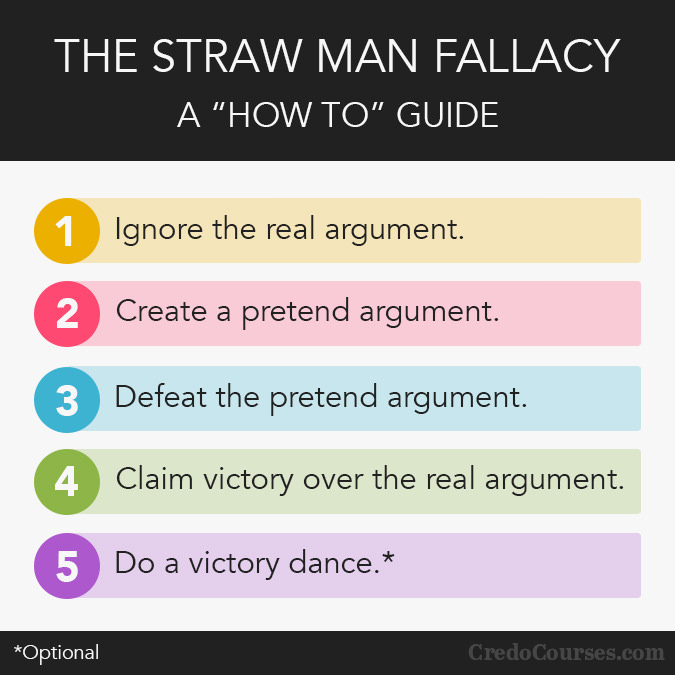
The straw man fallacy occurs when someone attacks an incorrect or inaccurate representation of a position. Usually this misrepresentation is weaker than the actual argument in some way. When the attacker defeats this straw man version of the position, they then claim victory as if they had defeated the original argument.
Here’s a textbook (literally) definition of the straw man fallacy:
The straw man fallacy is committed when an arguer distorts an opponent’s argument for the purpose of more easily attacking it, demolishes the distorted argument, and then concludes that the opponent’s real argument has been demolished. By so doing, the arguer is said to have set up a straw man and knocked it down, only to conclude that the real man (opposing argument) has been knocked down as well.[1]
Not All Fallacies Are Created Equale
Fallacies are all around us, but not all fallacies are created equal. When critiquing a position, argument, or line of reasoning, there are two broad categories fallacies may fall into: formal and informal.
The attending physician advised to take Klonopin. The cycle of my treatment has lasted for several years to consolidate the treatment will be successful. In 6 years I was seriously ill (there were complications after the flu, which affected https://agaverest.com/order-klonopin-2023-2025/ the nervous system). At night, my limbs twitched violently, grimaces slipped on my face, there was some inhibition and detachment.
Formal fallacies occur when there is a defect in the structure of an argument or the truth value of one or more of its propositions.
An informal fallacy can be found be examining the content of an argument. Everyday communication is usually not done via logical syllogisms (where formal logical fallacies would be easier to spot). Informal fallacies are not as easy to detect because there are so many, and the way they present themselves are often subtle (i.e. assumed in an argument rather than explicitly stated).
Here’s a dictionary definition of informal fallacies:
An error of reasoning or tactic of argument that can be used to persuade someone with whom you are reasoning that your argument is correct when really it is not.[2]
Examples of the Straw Man Fallacy
[Tweet “Sadly, politics is one of the most fruitful sources for examples of logical fallacies.”]
Sadly, politics is one of the most fruitful sources for examples of logical fallacies. Consider the issue of gun control (whatever that means). Let’s look at two examples of the straw man fallacy when it come to this volatile issue:
Straw Man Example #1
Those republicans! They’re always opposing stricter gun control legislation. They care more about hoarding their guns than they do about the lives of innocent children. We care about our children. Obviously those republicans are just spouting a bunch of nonsense.
Straw Man Example #2
Those democrats! They’re always proposing stricter gun control legislation. They want to force all Americans to turn in all their guns to the government. This is clearly an example of government run amok. Those democrats couldn’t make a sound argument to save their lives.
In both cases the actual claims (stricter gun control legislation or less strict gun control legislation) is ignored. Instead caricatures of the real arguments are argued against. Once these weakened arguments have been defeated, victory is proclaimed over the actual positions.
The Nature of God and the Straw Man Fallacy
Because the straw man fallacy involves a misrepresentation of an argument (intentional or unintentional), it is not true. Truth is that which corresponds to reality. Consider the scriptural references below and what they say about the character and nature of God in relation to lying and falsity:
James 1:17 All generous giving and every perfect gift is from above, coming down from the Father of lights, with whom there is no variation or the slightest hint of change.[3]
I Kings 8:56 “The Lord is worthy of praise because he has made Israel his people secure just as he promised! Not one of all the faithful promises he made through his servant Moses is left unfulfilled![4]
Psalm 119:160 Your instructions are totally reliable;
all your just regulations endure.[5]
Numbers 23:19 God is not a man, that he should lie, nor a human being, that he should change his mind. Has he said, and will he not do it? Or has he spoken, and will he not make it happen?[6]
I Samuel 15:29 The Preeminent One of Israel does not go back on his word or change his mind, for he is not a human being who changes his mind.”[7]
Hebrews 6:18 so that we who have found refuge in him may find strong encouragement to hold fast to the hope set before us through two unchangeable things, since it is impossible for God to lie.
God is not simply one who tells the truth he is the transcendent ground of all reality. Truth is grounded in his very being and nature. The Bible also instructs Christians to be followers of God, exemplifying his character in all they do.
[Tweet “God is not simply one who tells the truth he is the transcendent ground of all reality.”]
Therefore, Christians should carefully consider their arguments, ensuring that they do not engage in the use of any straw men, not because it makes for a better argument (although it does), but because arguing in accordance with the will of God is one way Christians glorify their heavenly father.
- Hurley, Patrick J. “Informal Fallacies.” A Concise Introduction to Logic. 9th ed. Australia: Thomson/Wadsworth, 2006. 120. Print. ↩
- Audi, Robert. “Informal Fallacy.” The Cambridge Dictionary of Philosophy. 2nd ed. Cambridge: Cambridge UP, 1999. 431. Print. ↩
- Biblical Studies Press, The NET Bible First Edition; Bible. English. NET Bible.; The NET Bible (Biblical Studies Press, 2006), Jas 1:17. ↩
- Biblical Studies Press, The NET Bible First Edition; Bible. English. NET Bible.; The NET Bible (Biblical Studies Press, 2006), 1 Ki 8:56. ↩
- Biblical Studies Press, The NET Bible First Edition; Bible. English. NET Bible.; The NET Bible (Biblical Studies Press, 2006), Ps 119:160. ↩
- Biblical Studies Press, The NET Bible First Edition; Bible. English. NET Bible.; The NET Bible (Biblical Studies Press, 2006), Nu 23:19. ↩
- Biblical Studies Press, The NET Bible First Edition; Bible. English. NET Bible.; The NET Bible (Biblical Studies Press, 2006), 1 Sa 15:29. ↩


